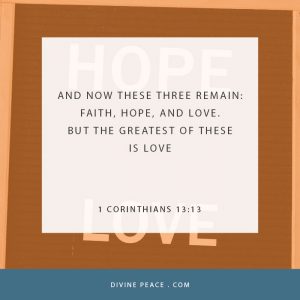February 3, 2019
Pastor Gunnar Ledermann
27 Now you are the body of Christ, and each one of you is a part of it. 28 And God has placed in the church first of all apostles, second prophets, third teachers, then miracles, then gifts of healing, of helping, of guidance, and of different kinds of tongues. 29 Are all apostles? Are all prophets? Are all teachers? Do all work miracles? 30 Do all have gifts of healing? Do all speak in tongues? Do all interpret? 31 Now eagerly desire the greater gifts.
And yet I will show you the most excellent way.
13 If I speak in the tongues of men or of angels, but do not have love, I am only a resounding gong or a clanging cymbal. 2 If I have the gift of prophecy and can fathom all mysteries and all knowledge, and if I have a faith that can move mountains, but do not have love, I am nothing. 3 If I give all I possess to the poor and give over my body to hardship that I may boast, but do not have love, I gain nothing.
4 Love is patient, love is kind. It does not envy, it does not boast, it is not proud. 5 It does not dishonor others, it is not self-seeking, it is not easily angered, it keeps no record of wrongs. 6 Love does not delight in evil but rejoices with the truth. 7 It always protects, always trusts, always hopes, always perseveres.
8 Love never fails. But where there are prophecies, they will cease; where there are tongues, they will be stilled; where there is knowledge, it will pass away. 9 For we know in part and we prophesy in part, 10 but when completeness comes, what is in part disappears. 11 When I was a child, I talked like a child, I thought like a child, I reasoned like a child. When I became a man, I put the ways of childhood behind me. 12 For now we see only a reflection as in a mirror; then we shall see face to face. Now I know in part; then I shall know fully, even as I am fully known.
13 And now these three remain: faith, hope and love. But the greatest of these is love.
1 Corinthians 12:27-13:13
Whether or not the Patriots win this evening, Tom Brady will still be considered one of the greatest NFL quarterbacks of all time. Now, I’m more of a watch the Super Bowl for the Doritos commercials, rather than keeping up with teams or stats, but I’ve heard enough to know Tom Brady is a big deal. Not only is he one of the best quarterbacks of all time in terms of passing and touchdowns, he has also been to more Super Bowls than any other quarterback. Tom Brady’s stats are impressive, but where was he forty years ago? He was a one year old. He was just learning to stand and walk. He wasn’t even close to being able to compete in the Super Bowl. And, where will he be in forty years? Will he still be considered one of the best? He certainly won’t be running out on the field to play. In forty years, his body will have aged like the rest of ours and someone young enough to be his grandchild will be in the spot light. Tom Brady is one of the greatest, but will his legacy last? All of us will have some kind of legacy, but the question is, “Will it last?” In our second reading from 1 Corinthians 12 and 13, Paul reminds us that God’s love is our lasting legacy.
Last week we were reminded to rejoice because God protects us. We read from the prophet Nehemiah and saw how God allowed him to provide both physical protection for the people of Israel with a wall around Jerusalem and spirutal protection with a sermon from the prophet Ezra. Throughout time, God has protected his people through his power and his Word, both of which come together in Christ. This week, both the second reading from 1 Corinthians and the gospel reading from Luke 4 pick up right after the readings from last week. In the gospel, Jesus’ revelation to the people of his hometown that he was the promised Savior resulted in their attempt to throw him off a cliff because of their lack of faith. In the second reading from 1 Corinthians 12 and 13, Paul continued his explanation of all believers as the body of Christ with each individual functioning as one part of that body with unique spiritual gifts. His explanation closed with the popular wedding verse,
13 And now these three remain: faith, hope and love. But the greatest of these is love.
Before Paul wrote about faith, hope and love, he had to focus the Corinthians back on what made them unique as the body of Christ. The Corinthians struggled to understand how their individual spiritual gifts were to come together as a body. They struggled with pride and comparisons between one another’s gifts. Paul had to remind them that the unique spiritual gifts they and all congregations enjoy as many parts of one whole body are less of a hierarchy of gifts and more of a mix of different categories of gifts. Paul wrote,
“28 And God has placed in the church first of all apostles, second prophets, third teachers, then miracles, then gifts of healing, of helping, of guidance, and of different kinds of tongues.”
In this list, Paul addressed the different gifts God has given to his church over time and those specific gifts he gave to the Corinthians. Paul went on to write,
“29 Are all apostles? Are all prophets? Are all teachers? Do all work miracles? 30 Do all have gifts of healing? Do all speak in tongues? Do all interpret?”
The answer was, “No.” God gave different people different gifts at different times for different purposes, but that doesn’t mean anyone gets to lord their gift over anyone else. Instead, Paul pointed out that the different gifts worked together and he closed his point with these words,
“31 Now eagerly desire the greater gifts.”
The greater gifts that Paul spoke of were those that serve the church. All believers are encouraged to desire the gifts that help share the message of Jesus’ salvation. These gifts can range from leading worship as pastor, teaching Sunday school, visiting the sick, taking care of the church grounds, praying for church members, playing an instrument, organizing events, etc. All these gifts work together to support the church, but when the desire is to use our gifts for ourselves and not the church, the body of Christ suffers. In our gospel reading from Luke 4, Jesus was in his own hometown, where the body of believers ought to have rejoiced that Christ, the head of the body was present with them, but they were not rejoicing. Instead, Jesus said,
“24 “Truly I tell you…no prophet is accepted in his hometown.”
The people in Jesus’ hometown had no desire for the greater gifts. Over centuries, prophets were sent to speak the Word of God to grow and strengthen the body of believers, but so often they were rejected. Jesus came to reveal himself as the fulfillment of all those prophecies about the Savior, but the people only recognized Jesus as Joseph’s son and not at all as the Son of God. The crowd had no faith, they had no desire for greater gifts that benefit the body of believers and they were so lost that they tried to throw Jesus off a cliff.
You and I desire the greater gifts. All of us are here today because we want to hear what Jesus has done for us. We would all love to trade places with the people of Jesus’ hometown to sit at Jesus’ feet listening to him preach and even be healed by him. God has also blessed our specific congregation with many gifts to serve God, one another and our community. We have the desire for gifts and we have been given many gifts, but Paul said there was one more thing, love. Paul cited amazing gifts as he wrote to the Corinthians like
13:1-3 speaking in tongues of men and angels…the gift of prophecy…faith to move mountains…giving away all possessions to the poor and even enduring bodily harm…but without love, there is nothing.
Without love the greatest gifts are useless. Love makes our gifts powerful to last beyond this world and into eternity. Love means our gifts give glory to God, not ourselves. Love means we use our gifts, even in awkward moments, when we have to put aside something we would rather be doing for fun, to relax, to make money, to gain popularity or when it is just going to take a long time, as Paul wrote,
“4 Love is patient, love is kind… 7 It always protects, always trusts, always hopes, always perseveres.”
We are not wired to use our gifts with the kind of love God wants us to use them with and for that we rely on him.
We have to rely on God’s love because his love never fails. The Corinthians had failed one another because they were splitting up the body of Christ by seeking their own glory, rather than sharing God’s glory with one another. We fall into the same sins by not using our gifts with love. Love gives us the perspective that
8 …where there are prophecies, they will cease; where there are tongues, they will be stilled; where there is knowledge, it will pass away. 9 For we know in part and we prophesy in part, 10 but when completeness comes, what is in part disappears.
God’s love gives us the perspective to understand that the gifts we have now all serve to point us to Christ. In Christ, we will one day be in the presence of God. For now, we only know him in part like a child becoming a man as Paul said. Now we are children only knowing, understanding, believing and trusting in the one true God, Father, Son and Holy Spirit, who created, saved and gave us faith in part. One day, we will be with him in heaven, fully understanding and experiencing God’s love. All the gifts we use to point people to Christ and serve the body of believers will no longer be needed in heaven.
Until we reach heaven, Paul wrote, 
13 And now these three remain: faith, hope and love. But the greatest of these is love.
Until we reach heaven we have faith in Jesus, faith in the Son of God who saved us and who we will one day stand before forever. We have hope in forgiveness of sins and eternal life, and one day all the good things we hope for in Christ will happen around us all the time and forever. Finally, we have love. This is the love of God. It is the kind of love from John 3:16 that God loved the word in such a way that he was willing to give up his one and only Son to die to give us life. It is a love for the undeserving. It is a love for all the world which was lost, for all born in the chains of sin, born without love for God, bound to
4…envy, … to boast, …to be proud. 5 … to dishonor others, …to be self-seeking, …to anger, …to keep a record of wrongs. 6 …to delight in evil.
God’s love is the love he had for us when we did not deserve it. God’s love punished his Son in our place to free us from our sins, to give us life and to make it so that God could love us forever. God’s love is our lasting legacy because his love for us will never change. God’s love is our legacy because it not only lasts in this world, but into the next. God’s love is our legacy because it is the greatest gift we can share with others.
Tom Brady’s legacy as one of the greatest quarterbacks of all time may or may not last. Forty years ago, he was just a toddler and forty years from now he probably won’t be on any nursing home flag football league. All of us will have some kind of legacy, but the question is, “Will it last?” God’s legacy for us will last, as Paul wrote,
“And now these three remain: faith, hope and love. But the greatest of these is love.”
The love we have
6 rejoices in truth,
the truth that through Jesus God’s love is our lasting legacy! Amen.



